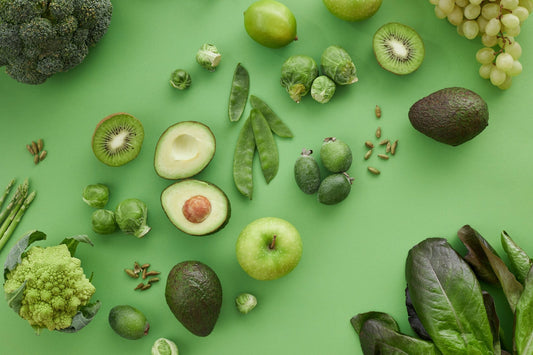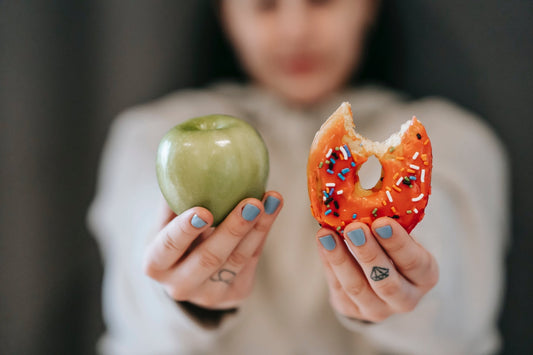We all need fruits and vegetables in our daily diet to give our body a dose of health and resilience with essential nutrients, minerals and vitamins.
Unfortunately, some fruits and vegetables contain large amounts of sugar and carbohydrates, which make the task of maintaining weight extremely challenging. If you regularly consume fruits like bananas and mangos, or vegetables like potatoes and corn, you should know that they contain large amounts of carbohydrates. And we all know that carbohydrates can make it difficult for you to achieve the results you desire. What do you eat instead?
The Best Food For Weight Loss:
These 9 alternatives will make the challenge of maintaining weight easier for you.
1. Apples
Apples are exceptionally nutritious fruits that are common almost everywhere around the world. One medium-sized apple eaten with the skin (about 182 grams) has a nutritional value of about 95 calories, 25 grams of carbohydrates and 5 grams of dietary fiber. The amount of sugar in an apple is about 19 grams, with the vast majority (about 11 grams) being natural sugars, such as fructose known as "fruit sugar." A study from the University of California that examined the contribution of apple ingredients to human health found that it contains chemical compounds that help control weight and contribute to the effort of weight watchers to enjoy a balanced and healthy diet. It has also been found that apple components contribute to the strengthening of bones, improving the function of the digestive system and lungs, as well as help in retaining muscle.
2. Grapefruit
Grapefruit is one of those love ‘em or hate ‘em fruits - perhaps due to its tart taste, but did you know that the special properties of this fruit make it markedly effective for weight watchers? It contains a minimal amount of sugar and is a rich source of fluids. About 100 grams of grapefruit contain only 7 grams of sugar along with large amounts of vitamin C as well as powerful antioxidants that contribute to the protection of the body. So even if you have a hard time getting used to the tartness of the grapefruit, we are sure you will appreciate the good it contains. Try drinking some fresh-squeezed juice in the morning or have it as a nutritious, low-cal snack in the evening.
3. Berries
The intense colors and sour-sweet flavors of the berries not only look good but they can turn any smoothie into a delightful and powerful drink. Did you know that they are also rich in dietary fiber and low in sugar? Strawberries are a great example of a berry whose sweetness can mislead you and make you think it is high in sugar and carbohydrates. In practice, one cup (about 144 grams) of fresh strawberries contains about 11 grams of carbohydrates, 3 grams of dietary fiber and 7 grams of sugar. So if you want to maintain the weight, but still enjoy the some sweetness, we recommend that you incorporate some berries in your diet. Additionally, they also contain large amounts of vitamin C, potassium, calcium, phosphorus, magnesium and antioxidants that take an active part in protecting the body.
4. Avocado
Many nutritionists around the world have crowned the avocado as a superfood, long may it reign! It is rich in dietary fiber, antioxidants and healthy fats that even those who want to lose a few pounds should eat. About 100 grams of avocado contain only about 7 grams of sugar and 9 grams of carbohydrates. In addition, the heart-healthy avocado can help lower your cholesterol and reduce cardiovascular inflammation.
5. Lemon and Lime
Not just a garnish anymore, lemons and limes are rich in vitamin C and contain a very negligible amount of sugar, only 1-2 grams. Lemons and limes have been credited with everything from boosting the immune system to increasing iron absorption to reducing inflammation and so much more. These super citruses can be added to drinks, squeezed over foods and salads, and frozen into ice-cubes. Even the lemon peel has shown health benefits and adds a boost when grated into sauces and foods.
6. Lettuce
Fresh lettuce is a great food that adds volume to our salads and contributes to the feeling of satiety at every meal. Lettuce is a healthy, low-calorie vegetable with a very small amount of sugar - about 100 grams of lettuce leaves contain about 96 grams of water, along with one gram of carbohydrates and only 2 grams of sugar. It is also considered a good source of vitamin K, which helps strengthen bones, and its regular consumption prevents their vulnerability. Remember, the darker the greens, the more iron, Vitamin A and other nutrients they contain.
7. Broccoli
If you have ever had a nutritionist prepare a daily menu for you, we are sure that it included broccoli. Broccoli belongs to the cruciferous family, which contains many medicinal properties, including a contribution to the body's ability to fight cancer. It contains various compounds and enzymes that actively work to prevent the recurrence of various cancers, by killing the cancer stem cells. About 100 grams of broccoli has about 3 grams of dietary fiber and only 2 grams of sugar - which makes it a healthy and low-carb vegetable. Broccoli is a wonderful source of many of the alphabet vitamins, including A, C, D, E, K, and is rich in calcium, iron, phosphorus and potassium. Steam it, stir fry it, mash it, or eat it raw – just include this super vegetable as much as you can.
8. Cabbage
Another great vegetable that belongs to the cruciferous family is cabbage. This is a vegetable with an extremely low caloric value and a minimal sugar level, which can be enjoyed in a variety of forms and dishes, raw and cooked. One serving of 100 grams of cabbage contains about 6 grams of carbohydrates, 3 grams of dietary fiber and only 3 grams of sugar, most of which is glucose and fructose. Like its predecessor on this list, broccoli, cabbage is also a rich source of many vitamins and contains essential minerals such as calcium, iron, magnesium, zinc and sodium.
9. Orange
Who doesn’t like fresh-squeezed orange juice with their breakfast? One medium-sized orange (about 140 grams) contains only about 12 grams of sugar, despite the sweetness. Like the rest of the citrus family, oranges are a rich source of vitamin C, and play an important role in producing body protein and maintaining capillaries. Eating the whole orange is the most beneficial way to enjoy oranges as you get the fiber benefits as well. Even the pith (that white stuff) contains a high amount of vitamin C. If you are drinking your orange, keep it fresh and keep it small, as the sugars in the juice can add up!




